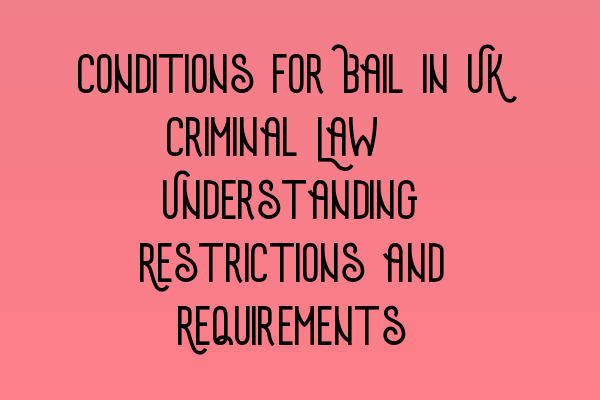Conditions for Bail in UK Criminal Law: Understanding Restrictions and Requirements
When it comes to criminal law in the UK, one important aspect to understand is the concept of bail. Bail refers to the temporary release of an accused person who is awaiting trial. It allows individuals to be released from custody while ensuring they comply with certain conditions and restrictions set by the court. In this article, we will delve into the conditions for bail, the requirements, and shed light on how these conditions are determined.
Restrictions and Requirements for Bail
The key purpose of imposing bail conditions is to mitigate risks associated with releasing an accused person before their trial. The specific conditions depend on the circumstances and the seriousness of the alleged offense. Some common bail conditions in the UK criminal law include:
- Residential Requirement: The court may require the accused person to reside at a specific address and not leave without permission. This ensures their availability for trial and reduces the risk of them fleeing.
- Curfew: A curfew condition may be imposed, restricting the accused person from leaving their residence during specific hours. This condition is often used if there is concern regarding the accused person’s involvement in criminal activities during certain times.
- Reporting: The court may require regular reporting to a police station or a designated authority. This provides a way for the court to monitor the accused person’s activities and ensure they comply with the conditions set.
- Non-Contact: In cases where the alleged offense involves a victim or a witness, the court may impose a non-contact condition. This forbids the accused person from contacting the individuals involved, minimizing the risk of interference or intimidation.
- Surrender of Passport: If the court believes there is a risk of the accused person fleeing the country, they may be required to surrender their passport.
Understanding the Determination of Bail Conditions
The decision on whether to grant bail and the specific conditions imposed is made by the court. The court takes into account various factors before making a decision, including:
- Nature and seriousness of the offense: The court considers the severity of the alleged offense and the potential risk posed by releasing the accused person.
- Previous criminal record: If the accused person has a history of criminal activity, the court may be more inclined to impose stricter bail conditions.
- Risk of interference or intimidation: If there is a concern that the accused person may interfere with witnesses or intimidate individuals involved in the case, the court will likely impose relevant conditions.
- Ties to the community: The court may consider the accused person’s ties to the community, such as employment, family, or other responsibilities, to assess the likelihood of them complying with bail conditions.
- Flight risk: If there is a substantial risk of the accused person fleeing the country, the court may deny bail altogether or impose stricter conditions.
It is important to note that bail conditions are subject to review and can be modified if circumstances change or new evidence is presented. The court aims to strike a balance between the rights of the accused and the interests of justice.
For more information on related topics, you may find the following articles helpful:
Understanding the conditions for bail in UK criminal law is crucial for both legal professionals and individuals involved in criminal cases. By comprehending the restrictions and requirements, accused persons can ensure their compliance and increase their chances of successful bail. If you require further information or assistance regarding bail conditions or any other legal matters, our expert team at SQE Criminal Law & Practice Law UK is here to help.
